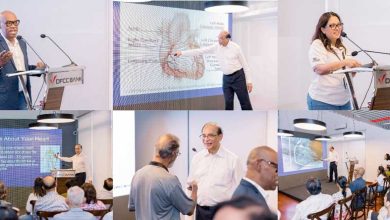NATIONAL CHAMBER OF EXPORTERS OF SRI LANKA
SRI LANKA’S FUTURE AT STAKE: NCE CALLS FOR RESPONSIBLE ELECTION PROMISES

As Sri Lanka approaches a pivotal presidential election, the National Chamber of Exporters of Sri Lanka (NCE) emphasises the need for responsible leadership during these challenging times. With the nation still recovering from a severe financial crisis, the stakes are higher than ever, and the consequences of playing popular politics during such a critical period could be disastrous.
With Sri Lanka on the cusp of the election, the NCE feels compelled to address the economic and fiscal concerns that are being widely discussed by the presidential candidates. The Chamber recognises that the policies proposed by them will significantly impact the future of our economy, particularly in the context of Sri Lanka’s ongoing recovery from a challenging financial period.
In recent weeks, many candidates have made bold promises regarding fiscal policy reforms, including significant increases in state sector wages – some proposing hikes of over 50 percent. While such promises may appeal to voters, the NCE cautions against the potential economic repercussions.
Sri Lanka is still navigating its way through a difficult financial recovery, with the government having recently implemented necessary but stringent measures to meet the requirements set by the International Monetary Fund (IMF). These measures included tax increases and efforts to revamp state-owned enterprises (SOEs) that have long been operating at a loss.
One of the most pressing challenges facing the country is the high cost of maintaining a bloated public sector workforce, a situation exacerbated by previous administrations fulfilling election promises through ad hoc employment practices.
The financial burden of these practices is unsustainable, and the NCE urges all candidates to consider the long-term implications of further expanding the state sector without a clear, sustainable plan.
Moreover, the private sector has also borne the brunt of increased taxes, with many employees facing higher PAYE tax slabs. This has placed considerable strain on their personal and family finances, especially for those with existing financial commitments like housing and personal loans.
Despite these hardships, the people of Sri Lanka have largely accepted these fiscal changes, understanding that they are necessary for the country’s long-term prosperity.
The business community, including our member exporters, has been operating under increasingly thin margins due to higher taxes and other fiscal challenges. These efforts have been made in the spirit of contributing to the nation’s economic upliftment.
However, the NCE is concerned that election promises – such as tax reductions and significant wage increases – should be approached with careful consideration to avoid raising the risk of economic instability if these promises cannot be fulfilled.
The business community and exporters, who are crucial to Sri Lanka’s economic recovery, are particularly vulnerable to the consequences of popular politics. Unstable economic policies and unpredictable fiscal environments create uncertainty for businesses, making it difficult for them to plan and invest for the future.
This can lead to reduced productivity, loss of international competitiveness, and ultimately, job losses. Furthermore, businesses that rely on foreign clients may struggle to maintain relationships if the country is perceived as unstable or untrustworthy.
THE TRUST OF THE PEOPLE AND THE RISKS OF UNREALISED PROMISES
As the election campaigns unfold, the NCE underscores the critical role that trust plays in the democratic process. The people of Sri Lanka are placing their faith in the promises made by the presidential candidates, many of whom are advocating for substantial changes to the country’s fiscal policies.
These promises, which include significant tax cuts and wage increases, are undoubtedly appealing to a population that has endured years of economic hardship.
However, the NCE warns that trust is a fragile commodity. If the promises made during the campaign are not delivered, the consequences could be dire. The public’s expectations are being shaped by these commitments, and any failure to meet them could lead to widespread dissatisfaction.
Sri Lanka has already witnessed the impact of broken promises and unmet expectations during the recent “Aragalaya” movement, where people took to the streets to express their frustration. This unrest not only caused significant social upheaval but also damaged the country’s international credibility.
The NCE urges all presidential candidates to recognise the weight of their words. Election promises must be made with a deep sense of responsibility, as they shape the hopes and aspirations of millions. The people of Sri Lanka deserve honesty and transparency from their leaders. Over-promising and under-delivering could ignite another wave of unrest, leading to instability that would affect every sector of society, including the vital export industry.
A CALL FOR RESPONSIBLE LEADERSHIP
In times of crisis, the temptation to play popular politics – making grandiose promises to win votes without considering their feasibility – can be especially strong. Candidates may feel pressured to offer quick fixes or sweeping reforms that resonate with the electorate, even if these promises are not grounded in economic reality. While such tactics might yield short-term political gains, the long-term consequences can be detrimental to the nation’s stability and prosperity.
In light of these considerations, the NCE urges all presidential candidates to exercise caution in their campaign promises. It is crucial that any policy changes are communicated transparently and responsibly to the public. Creating unrealistic expectations could lead to widespread disappointment and unrest, with severe consequences for the entire nation.
The NCE calls on all candidates to provide the people of Sri Lanka with accurate, honest information about their policy proposals and to consider the long-term stability and prosperity of the country in their decision-making. We emphasise that the stakes are high, and the nation cannot afford another period of economic or social turmoil. The trust of the people is a sacred bond, and it must be honoured with integrity and foresight.
In conclusion, the NCE emphasises that Sri Lanka cannot afford to play popular politics during this critical period. The decisions made in the coming months will shape the nation’s future for years to come. Responsible, thoughtful leadership is essential to ensure that Sri Lanka emerges from this crisis stronger and more resilient than ever.





